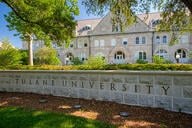You have /5 articles left.
Sign up for a free account or log in.
Two groups that are prominent in the field of religious studies have released a joint report documenting the damage to the academic job market in the discipline -- and a shift away from a tenure-track norm for positions that are available.
The report by the American Academy of Religion and the Society of Biblical Literature examines job trends from 2001-2010 and finds modest but steady growth up until 2008, with the number of job listings dropping by 46 percent in 2009. The figures are based on the number of positions listed with the two associations. The report acknowledged that not all jobs are listed with the groups, but many disciplinary associations do similar studies based on the listings they receive and the ups and downs of the market are generally well-reflected in these data.
In 2010, the number of jobs bounced back by 24 percent, but the field ended the decade with fewer jobs being listed than was the case at the start of the period.
Of particular concern to the associations was a shift in the type of jobs advertised. Historically, the vast majority of jobs listed with the two associations have been tenure-track positions, as was the case with 82 percent of jobs listed in 2008. But in 2009, that figured dropped to 51 percent, and it rose to only 61 percent in 2010 -- so not only are there fewer jobs, but positions promising the possibility of job security are in even shorter supply. The report says that a key issue going forward will be to see whether this shift away from a tenure-track norm is "temporary" or a "reconfiguration" of the academic job market.
In terms of subject matter, the study found three major categories of position openings:
- Modern religions and their histories, including comparative and world religions (32 percent of positions).
- Biblical studies and related disciplines, including ancient Near Eastern languages and literatures, Second Temple Judaism and early Christianity (29 percent of positions).
- Theology, philosophy and ethics (22 percent of positions).
The study also examined which subfields appear to be the most healthy right now (in terms of hiring) by looking at the positions being listed since the economic crash of 2008.
In the field of modern religions and their histories, nearly a third of the positions listed in 2009 (the worst job market year) were in Islam, and those jobs were up fourfold from 2008 to 2009. In biblical studies, the growth was in New Testament and early Christianity positions. And in the area of theology, philosophy and ethics, theology positions doubled from 2008 to 2010, reaching 61 percent of all of the positions.




